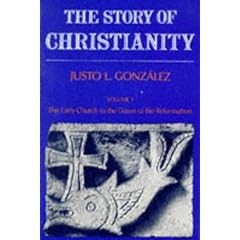I finished reading Feminine Threads:Women in the Tapestry of Christian History by Diana Lynn Severance on Tuesday afternoon. On Tuesday evening I wrote a letter to Dr Severance to thank her for writing this outstanding book.
Feminine Threads is a church history book. And there are
lots of good reasons to read church history. If you are a church history novice then this would be a good place to start. It is a slim volume (just over 300 pages) and it provides a good survey of the history of the Christian church. There is enough detail to get a sense of the major events and flavours of the various periods of the church, starting with the New Testament era and finishing in current times. The book was published earlier this year so it's right up to date.
What sets this church history survey apart is that it's told through the stories of the women of the times. Some of them are the mothers, sisters and wives of famous men in church history. Others are (or have become) famous in their own right - for reasons ranging from being born a queen through to the powerful testimony of lives well lived despite (or maybe because of) humble beginnings.
Interestingly, as I turned the pages of this book I observed that many of the women's stories were quite similar. Don't think for a minute though that this book is repetitive and boring. What changes is the political, social, economic, theological, geographical and cultural landscape. And of course each story has its unique blend of personality, relationships and opportunities. But what is deeply comforting is the repetition of women responding to their enormously varied circumstances with godliness, faithfulness, abiding trust in and dependence upon Him and seeking to bring Him all honour and glory.
It is this that makes Feminine Threads a profoundly encouraging book for women. I found myself convicted ever more deeply to be praying for those in my midst and I feel warmly encouraged to press on with the humble activities that fill my week, walking in the footsteps of those who have, by faith, gone before me.
And what's in this book for men? The opportunity to more fully apprehend God's good plans for women as set out in the Bible and to see that in action time and again through history in order to encourage and build up the women in your own lives who are seeking to live in ways that please and honour God.
And of course men and women alike get a good dose of church history along the way, which is always edifying.
Millions of women in following Christ have followed the New Testament pattern of Christian women - lifting up the needs of others in prayer, mentoring other Christians, supporting church leaders, showing hospitality, fellow-labouring as missionaries, supporthing their husbands in Christian work, instructing other women, evangelising and sharing the Word with others, teaching children, and helping those in need and distress. These Christian women were from the poor and rich, from every class of society, and from every continent of the globe. They were not perfect, but they have obtained a good testimony through faith in the One who gave His life a ransom to redeem them for God. They are the feminine threads in the rich tapestry of Christian history
That is the final paragraph of
Feminine Threads: Women in the Tapestry of Christian History by Diana Lynn Severance. It summarises the content and essence of this clearly, eloquently and beautifully written book. I can't commend it to you highly enough. Put it on your Christmas list. At the top.
 This particular rendering of church history is a great read. Shelley is a man who clearly loves God and his writing is very pastoral. He spends plenty of time explaining the contemporary significance of church history. This is extraordinarily helpful, making this book so much more than a list of dates, names, places and events.
This particular rendering of church history is a great read. Shelley is a man who clearly loves God and his writing is very pastoral. He spends plenty of time explaining the contemporary significance of church history. This is extraordinarily helpful, making this book so much more than a list of dates, names, places and events.

